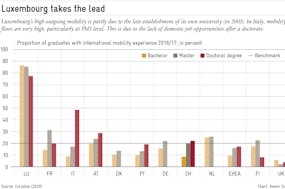In today’s Switzerland, only men have a constitutional obligation to serve in the armed forces. The Swiss army is based on the militia principle, i.e. that every citizen has to fulfill public duties as a non-professional, such as serving in the army. Women, by contrast, can volunteer. In 2017 they represented just 0.7 per cent of the military personnel – or 1,152 individuals. Related to the entire resident population and given declining army troops, only one young person in four – mostly male – ends up doing a military service.
Many more women would be willing to enlist in some form of institutionalized community service, but have virtually no opportunity. ‘Civic service’, the alternative to ‘classic’ military service, is open only to those declared fit for the draft. But, to be admitted, a woman must first volunteer for military service, then prove by act she is a conscientious objector. Such Kafkaesque barriers are anachronistic in an era when traditional gender divisions are becoming obsolete.
A citizen service for women and men, as outlined by Avenir Suisse, would reflect the social changes in Switzerland’s militia system of volunteering, as well as being more equitable and, not least, improving operational capabilities through a better gender mix.
More recognition for women
Women already do a lot for society. Federal statistics show they continue to conduct the bulk of unpaid work, like helping friends and relatives. In 2016, women performed an average 30.1 hours a week of unpaid labor, against 19.5 hours for men.
Such work, which often goes unnoticed because it is gratis and barely institutionalized, is particularly useful at a time of an ageing population requiring ever more care. Introducing ’citizen service’ would make such work more visible, as it would take place – at least partly – in an institutional framework. And such recognition would, ultimately, contribute to a more egalitarian society.

A better gender mix would help not just the army, but also other services like the fire brigade. (pd)
Seizing lost opportunities
Commitment within the framework of ‘citizen service’ also has moral value, as every citizen would be seen to contribute to the common good. In the sense of a participatory public good, the more people participate, the greater the added value for society. Moreover, individuals benefit from collective participation.
Citizen service would also allow women to strengthen their position in society by broadening their horizons, expanding their networks and offering more opportunities for leadership and responsibility. That could be an advantage in the labor market, where more than half of the population – mostly women – still don’t have such opportunities.
Diversity adds value
Studies show gender diversity in the workplace contributes to corporate economic success. Having more women in companies would provide different perspectives, backgrounds and experiences indispensable for good decision-making. Mixed teams and committees think more flexibly, are better able to compromise and can improve organizational performance.
Such a more balanced gender mix would also help the army and other public services. Introducing ‘citizen service’ would significantly deepen the recruitment pool. Specific qualifications would gain importance, allowing the best qualified and motivated candidates to be deployed in the right functions – regardless of age and gender.
All in all, not just the armed forces, but organizations like the fire brigade and other public functions would be strengthened through complementary competences, while women would gain experience broadening their horizons – all boosting gender equality.
True gender equality is achievable only if people are treated equally. That requires mechanisms that contribute to appropriate recognition of the work done by women. But it also needs women to demonstrate they are prepared to accept the same social obligations as men.





